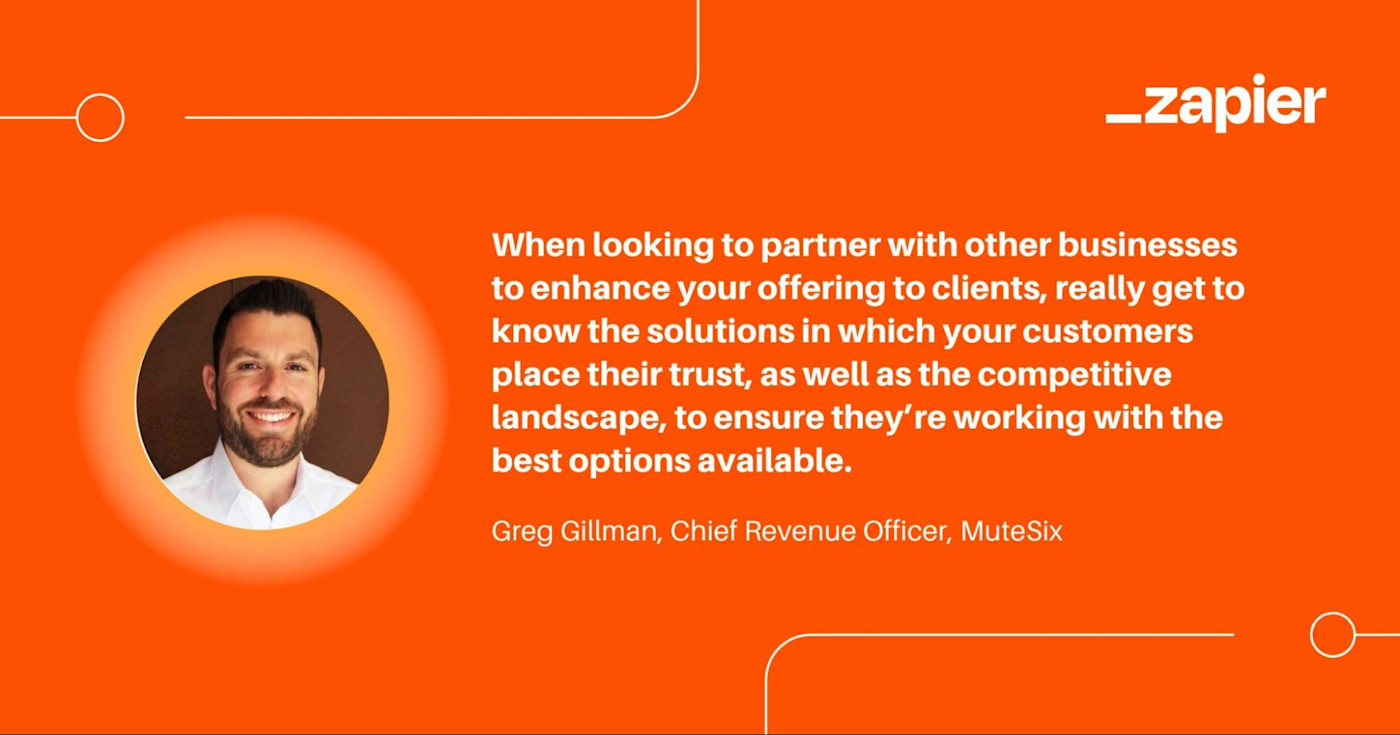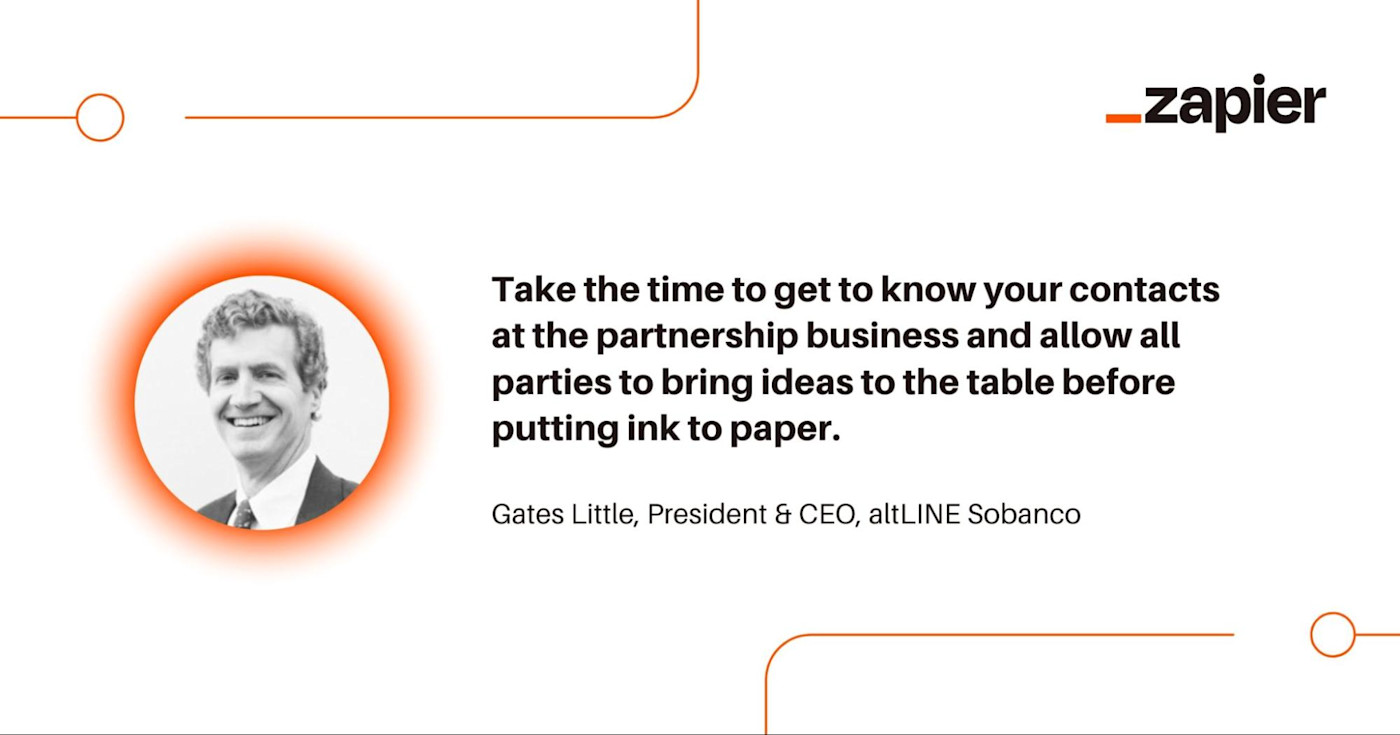Building strategic partnerships is key for any growing business. We asked experts for their tips on how to build strategic partnerships, and this is what they said.
1. Make your pitch hyper-targeted
"To land a strategic partnership, ensuring that your initial outreach pitch is hyper-targeted to your future partner's interests is important.
If you reach out with a generic pitch that isn't targeted to the potential partner, they are less likely to be interested. But if you can provide specific detail on why a partnership makes sense, your interest will soar.
Most companies only have a few high-value strategic partnerships, so sending the right message to ideal prospects is essential."
Axel DeAngelis, Founder, NameBounce
2. Look for overlapping core values

"You may be in synergistic industries, but a strategic partnership has to begin with shared core values. Much like personal relationships, there will always be differences between businesses, but if there are not enough shared goals, visions, or values, then any long-term partnership can be doomed to fail, no matter how promising it may look on paper.
Therefore, when looking to partner with other businesses to enhance your offering to clients, really get to know the solutions in which your customers place their trust, as well as the competitive landscape, to ensure they’re working with the best options available. In doing so, you will gain the valuable information you need to identify businesses that share your core values and build a partnership that benefits both you and your customers."
Greg Gillman, Chief Revenue Officer, MuteSix
3. Establish criteria where both parties can win
"When looking to partner with another company, it's important to remember that you are looking for a relationship, not just a transaction. That means you should look for a company that has similar values and goals as your own. You should also be willing to make concessions in order to make the partnership work.
Of course, you don't want to make unlimited concessions just to make the deal work. In my first company, WriteLab, we formed several strategic partnerships with companies in Asia, licensing our technology to power their products. Aside from visiting and spending time with them, we focused on developing an objective set of criteria we believed would help us facilitate our negotiations. In this way, we could negotiate on the merits and not succumb to tactics of positional bargaining or appeals to relative power. By negotiating on objective standards of value, price, and access, not only were the deals much easier to close, but both parties felt they got a good deal."
Matthew Ramirez, CEO, Rephrasely
4. Be confident
"Confidence remains one of the most attractive traits in general and can play a major role in securing a promising collaborator.
If you want to land a strategic partnership that will be a golden ticket to join the industry's top dogs, own your ideas and show that you have full confidence in their potential. Add to that a bit of charisma, and you will undoubtedly catch the attention of potential strategic partners."
Natalia Brzezinska, Marketing & Outreach Manager, US Visa Photo
5. Conduct a partnership audit
"Strategic partnerships changed the way I do business. The one tip for landing a strategic partnership is to conduct a partnership audit. Prior to establishing partnerships, you want to be sure that you evaluate your partnership potential.
This audit will allow you to take an inventory of the current state of your business and determine if you are prepared and positioned to establish, secure, and retain strategic partnerships. Once you complete the audit, you will discover whether you are ready to share your vision with your ideal powers, or if you should focus on restructuring elements of your business. If it's the latter, concentrate on nurturing the relationship with your prospective partner before you try to pitch."
A. Margot Blair, Author, Educator, and Strategic Advisor, AMB Consulting & Co.
6. Look for the right team at the right level
"It can be tempting, when you're looking for a strategic partnership, to go to the biggest company and solicit their services. They have thousands of people and millions in profit. They must be the best option, right? Unfortunately, it's often not the right choice. Small to medium-sized businesses are a blip on the radar for these enterprises, so you will talk to a junior person or team without the benefits of a tailored approach.
When you partner with a company that is smaller, you're more likely to get an agile team of experienced strategists who have your best interests at heart and who can adjust their approach to suit your needs. Bigger is not always better."
Matthew Stibbe, CEO, Articulate Marketing
7. Show your product in action
"Showcasing your product in action is one of the best ways to land a strategic partnership. When a potential partner can see how your product is being used, they'll be able to better understand its value.
In addition, seeing your product in action will give them a taste of what it's like to work with you and your team. If they like what they see, they'll be more likely to want to collaborate with you on future projects.
So if you're looking to land a strategic partnership, make sure to put your product front and center. Show them how it's being used and let them experience its value for themselves. With a little hard work and some luck, you should be able to secure the partnership you're after."
Lorien Strydom, Executive Country Manager, Financer.com
8. Take your time

"The thing about strategic partnerships is that they take time. A deliberate effort to connect, strategize, and decide to collaborate will always take time, as two major parties are involved. The partnership needs to be mutually beneficial, and you just can't rush a good thing.
Take the time to get to know your contacts at the partnership business and allow all parties to bring ideas to the table before putting ink to paper. If a potential partner feels rushed, they may walk, so court them a little and don't worry about how long it is taking.
With this in mind, start early; giving yourself a few weeks or even a couple of months won't be enough, so plan ahead!"
Gates Little, President & CEO, altLINE Sobanco
9. Build a personal brand on social media
"Landing a mutually lucrative strategic partnership is only possible if you connect with the other party. Otherwise, everything is extremely transactional. What really helped me was building my personal brand on LinkedIn and connecting with other professionals, some of which are now my most valued partners.
We often forget that we work with people, not companies, and we end up looking at partnerships solely through the lens of gaining. But at the end of the day, those decision-makers are still humans and still want to feel an actual connection with their strategic partners.
The beauty of social media is that we can stay connected and top of mind by creating valuable content and offering actionable advice publicly, which definitely played a huge part in all of our partnerships."
Gordana Sretenovic, Co-Founder, Workello
10. Identify your business goals
"Landing a strategic partnership may be difficult for you if you don't know what you want out of it. So, I recommend you first clearly define your business goal before going for a partnership.
You need to keep in mind what exactly you are trying to accomplish. Every successful enterprise looks for a partner that can help their business enter a new market, increase sales in an existing market, obtain financial or human capital, and improve access to technology.
Further, define each point of your goal clearly about what you want to achieve from it. And be ready to give as much as you want in return. Plus, make a deal with a partner who can move full steam ahead."
Joe Troyer, Chief Marketing Officer, ReviewGrower
11. Ask for an introduction
"One tip for landing a strategic partnership is to follow networking best practices. Instead of doing a cold outreach, try to find a common contact between you and the company and ask for a warm introduction.
The reason this introduction is important is that it vouchsafes you to the company as a valuable contact. When you follow this method, you want to make sure that when you reach out, you have a message that is tailored to the company and that you can provide value."
Kate Duske, Editor-in-Chief, Escape Room Data
12. Know your target's other strategic partnerships
"You can save a lot of time and effort by understanding the types of strategic partnerships your target(s) like. Do your research and find out—for each potential partner—what other partnerships they have. This will tell you:
If they are similar to you. If so, how?
Do they provide the same win-win that your partnership will provide?
Do they encourage strategic partners? Or would you be the first?
If you learn and understand your target's goals by reviewing the other strategic partnerships they've done, or have to date, you'll be way ahead of the game.
If partnering with you will provide similar benefits, talk about how. Their ears will perk up when you tell them you can provide the same—or better—results from a strategic partnership!"
Janet Granger, CEO, Marketing Strategist, Mentor, & Coach, Two Beagles
13. Find businesses with similar clients
"One tip for landing an effective strategic partnership is to find other businesses who serve the same clients or customers as you, but not in a way that overlaps with what you offer. The two businesses need to be complementary, but not directly competing. This is the sweet spot.
As an example, our email agency here at Ecommerce Intelligence tries to partner with other agencies, consultants, and service providers who work with eCommerce brands like we do—but don't sell our primary service. Companies selling services such as SEO, content marketing, or Google Ads are great potential partners for us. It would make sense to recommend each other's services to our respective client bases.
It's also a good idea to make sure any potential partner does not have immediate plans to expand their offering to compete with you directly."
Ryan Turner, Founder, Ecommerce Intelligence
14. Start with "What's in it for them?"
"Getting the attention of a potential strategic partner is really hard. That's why you need to start with 'what's in it for them?' A partnership should benefit both sides, but the other company doesn't care how you benefit from the partnership; they only care about how they benefit.
With the last SaaS company I sold, I wanted to offer add-on services on the backend of the software as an upsell. I didn't have the infrastructure to fulfill those services in-house, so I reached out to a few companies as potential partners.
In order for our partnership to work, they were going to have to give me big discounts on their services that I could mark up to my users. Of course, I didn't lead with that. I talked to them about how I had a bunch of users that were looking for their services and I was trying to find the right partner who could help my users out. This would be a huge revenue boost for them.
This approach got the attention of every company I reached out to."
Adam White, Founder, SquidVision
15. Demonstrate value immediately
"In order to build our partner marketplace, we needed to get strategic partnerships set up with companies that were much bigger and more established than we were. We learned early on that going to each of those companies and explaining our hypothetical value proposition was far less effective than coming to those companies with a real-life example of our value.
We help businesses shop for the right HR software platforms, and coming to the HR software vendors with actual live customers that were interested in their platform helped to grease the wheels internally and move partnership conversations around significantly faster."
Brett Ungashick, CEO & CHRO, OutSail
16. Give more than they ask for
"Strategic partnerships come down to being as present as possible, so you remain top of mind, just like in customer marketing and business development. Doing the work before they ask for it helps make it harder for a partner to say no to working with you. Build the sales enablement resources they need in different variations and formats.
Proactively seek event activation timelines or offer account introductions to those in their ICP (Ideal Customer Profile) to show you would put in more work on your end of the partnership.
Being proactive and present are great ways to show a partner they should trust and work with you."
Charlie Riley, Founder & CMO, Charlie Riley
Zapier is the leader in workflow automation—integrating with 6,000+ apps from partners like Google, Salesforce, and Microsoft. Use interfaces, data tables, and logic to build secure, automated systems for your business-critical workflows across your organization's technology stack. Learn more.






